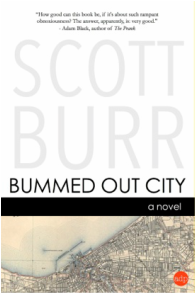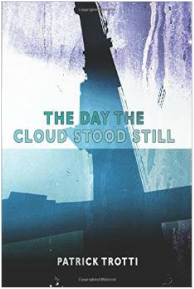Patrick Trotti's new collection of short stories launches today. Here's an interview with this exciting new writer!
Q: How did you come to writing? Did you always want to do this?
A: I never wanted to be a writer growing up. I wanted to be a professional baseball player. When I realized that I couldn't hit a curveball, that kind of burst that bubble. I stumbled into journalism in community college. It was good, and I was enjoying myself, and then I came across a quote that said, “Do something worth writing about instead of just writing about the accomplishments of others.” It's probably written differently but that was the gist of it. I started with a few creative writing classes, was lucky enough to have incredible teachers, and found myself doing something for school credit that I would be willing to do on my free time.
Q: Your stories deal frankly with the recurring themes of mental illness, addiction, and recovery. Why?
A: I deal with these topics daily. Sadly, drug addiction and mental illness come in pairs. Long story short, I managed to ruin my life by the end of high school. I was always an all-or-nothing personality, and by the time I was eighteen, I'd been through multiple rehabs, detoxes, arrests, and overdoses and seizures. Once I got far enough away from the crack and cocaine and heroin and alcohol, I was diagnosed with bipolar disorder. Later on I was also diagnosed with severe anxiety. I've managed to stay out of trouble for almost a decade. I'm lucky and for me that luck comes with responsibility, because something out there was looking after me for all those years. I guess my way of paying it forward is to find something I love doing and do it to the max. Does that make sense?
While a lot of my writing comes from what I've gone through, I'm by no means a memoirist. Parts of my writing are therapeutic and parts are just a product of my “glass is half empty” life view. I'm not really interested in the feel-good stories where everyone ends up great. That's not life; at least not to me.
Q: What are your main inspirations?
A: As far as authors go--Jack Kerouac, Ernest Hemingway, George Saunders, and David Foster Wallace. The person who inspired me the most was my paternal grandmother. She lived the majority of her life with multiple sclerosis, and did so with a grace and charm I thought only classic movie actresses possessed. She introduced me to Frank Sinatra and always believed in me.
Q: Tell us about some of your recent projects.
A: I've just completed a collection of stories that all center loosely on my childhood. They deal with place and its impact on character, as well as with poverty. I'm also working on a novel about a couple that experiences problems shortly after getting married, and on an epic (only in the sense of length!) poem that I hope will materialize into something book-length.
Q: What are you reading now?
A: Binary Star by Sarah Gerard and Made to Break by D. Foy. Actually, I'm rereading Gerard's. Both texts are lovely.
Q: How did you come to writing? Did you always want to do this?
A: I never wanted to be a writer growing up. I wanted to be a professional baseball player. When I realized that I couldn't hit a curveball, that kind of burst that bubble. I stumbled into journalism in community college. It was good, and I was enjoying myself, and then I came across a quote that said, “Do something worth writing about instead of just writing about the accomplishments of others.” It's probably written differently but that was the gist of it. I started with a few creative writing classes, was lucky enough to have incredible teachers, and found myself doing something for school credit that I would be willing to do on my free time.
Q: Your stories deal frankly with the recurring themes of mental illness, addiction, and recovery. Why?
A: I deal with these topics daily. Sadly, drug addiction and mental illness come in pairs. Long story short, I managed to ruin my life by the end of high school. I was always an all-or-nothing personality, and by the time I was eighteen, I'd been through multiple rehabs, detoxes, arrests, and overdoses and seizures. Once I got far enough away from the crack and cocaine and heroin and alcohol, I was diagnosed with bipolar disorder. Later on I was also diagnosed with severe anxiety. I've managed to stay out of trouble for almost a decade. I'm lucky and for me that luck comes with responsibility, because something out there was looking after me for all those years. I guess my way of paying it forward is to find something I love doing and do it to the max. Does that make sense?
While a lot of my writing comes from what I've gone through, I'm by no means a memoirist. Parts of my writing are therapeutic and parts are just a product of my “glass is half empty” life view. I'm not really interested in the feel-good stories where everyone ends up great. That's not life; at least not to me.
Q: What are your main inspirations?
A: As far as authors go--Jack Kerouac, Ernest Hemingway, George Saunders, and David Foster Wallace. The person who inspired me the most was my paternal grandmother. She lived the majority of her life with multiple sclerosis, and did so with a grace and charm I thought only classic movie actresses possessed. She introduced me to Frank Sinatra and always believed in me.
Q: Tell us about some of your recent projects.
A: I've just completed a collection of stories that all center loosely on my childhood. They deal with place and its impact on character, as well as with poverty. I'm also working on a novel about a couple that experiences problems shortly after getting married, and on an epic (only in the sense of length!) poem that I hope will materialize into something book-length.
Q: What are you reading now?
A: Binary Star by Sarah Gerard and Made to Break by D. Foy. Actually, I'm rereading Gerard's. Both texts are lovely.




 RSS Feed
RSS Feed